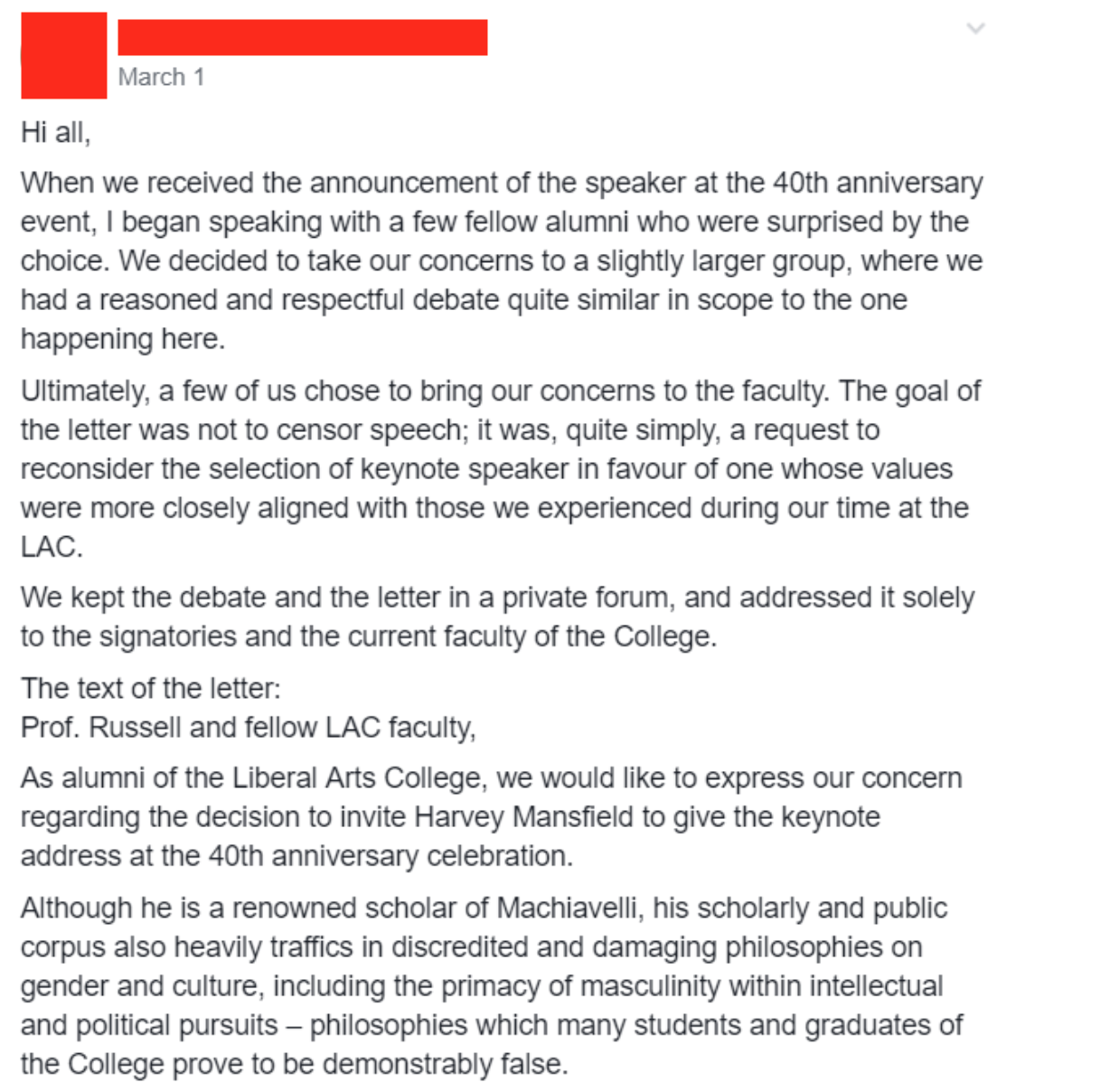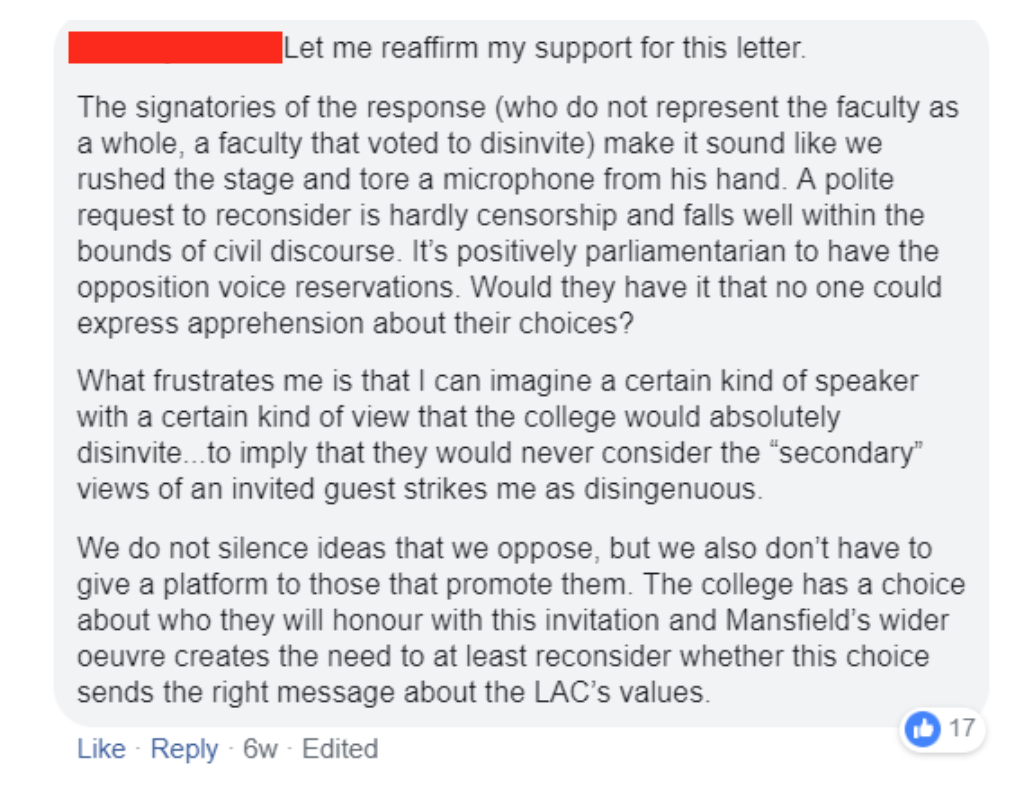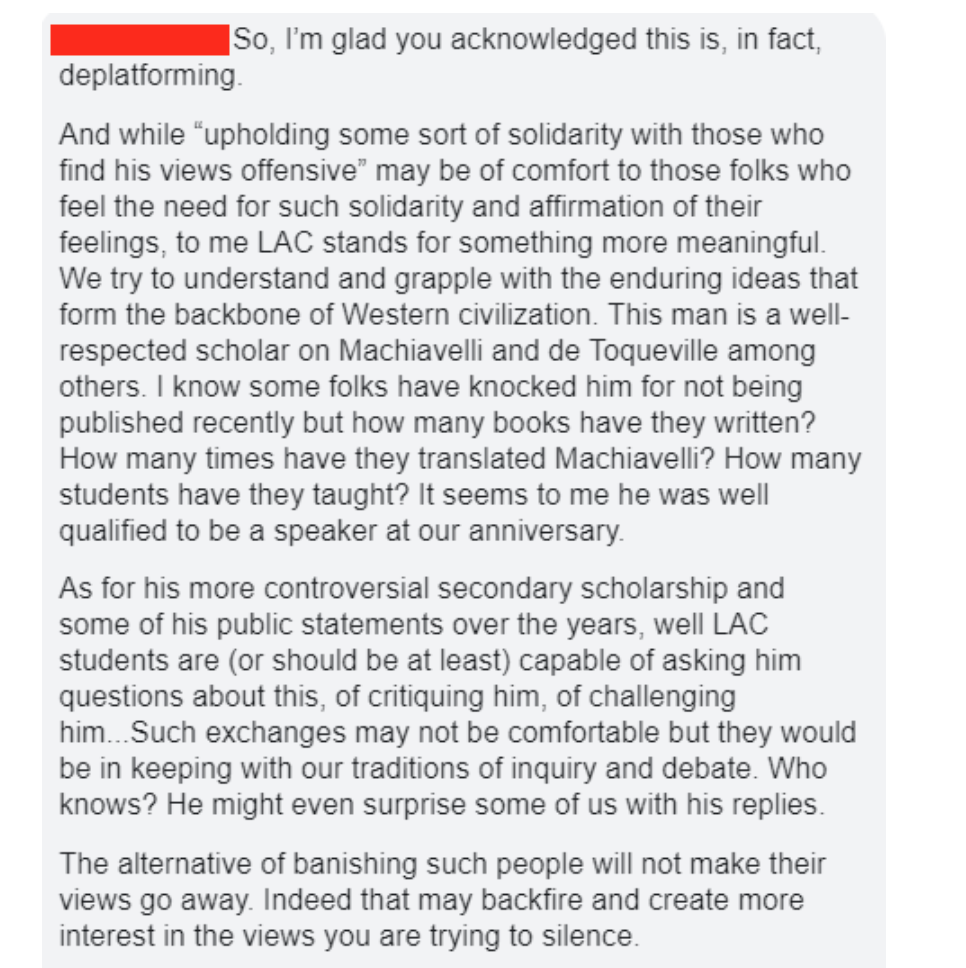Free Speech
How to Prevent Campus Deplatformings: Lessons from Harvey Mansfield and Concordia University
Universities have no obligation to invite any particular public figure to speak on campus. But once they’ve promised someone a platform, the stakes are raised: Both speaker and audience are invested in the outcome.

It’s been a year since Atlantic magazine hired, then abruptly fired, conservative writer Kevin Williamson. Shortly after the story came full circle, I caught up with a friend who then worked closely with the Atlantic. He told me that hiring Williamson had been a mistake from the get go.
“So you agreed with the decision to fire him?” I asked.
“Not quite,” he replied. “Imagine you have this friend who tells you he’s going to get a puppy. And you say, ‘Don’t do it. I know you. You’re not a puppy person.’ But he gets the puppy anyway. Then the weeks pass, and he comes to you and says, ‘You were right. I shouldn’t have gotten the puppy.’ But now it’s too late. Your friend is stuck with the puppy. That’s how life works.”
It’s an allegory I come back to often in this age of deplatforming. Universities have no obligation to invite any particular public figure to speak on campus. But once they’ve promised someone a platform, the stakes are raised: Both speaker and audience are invested in the outcome. If Speaker A is picked to appear at a university convocation, this inflicts no hardship on equally reputable Speakers B through Z. But if Speaker A’s appearance subsequently is canceled, this doesn’t restore A’s reputation back to the status quo ante. It has a net negative effect, because deplatforming generally is interpreted as signalling some real or imagined disgrace or defect (though that is changing, now that so many smart, reputable people have suffered this fate).
Last week, Harvard political philosopher Harvey C. Mansfield wrote an essay for The Wall Street Journal describing his own deplatforming from a commencement event marking the 40th anniversary of the Liberal Arts College (LAC), a small academic unit of Concordia University in Montreal. If this is the first time you’re hearing of the controversy, that’s because neither Mansfield nor the LAC seemed eager to make a big fuss about it.
Mansfield, an expert on Machiavelli and de Tocqueville (among countless other subjects), appeared more bemused than angry about his own deplatforming. But in his essay, he does express serious concern with the broader trend. Free speech of all stripes should be encouraged, he argues, because a clash of views helps us all make our way toward truth, or at least “a reasonable settlement” of competing claims; whereas deplatformers see speech “not [as] an alternative to power but [as] a form of power—political power—and political power is nothing but the power to oppress.”
The LAC deplatforming is a particularly interesting specimen of the genre because, as discussed below, it comes with a rich paper trail. But it also comes with an odd (and delightfully Canadian) twist, whereby the LAC tried to maintain the polite pretence that Mansfield wasn’t being deplatformed, even in the midst of his deplatforming. No, nothing like that. Instead, he had been victimized by a suddenly manifested lack of “consensus as to what [the school] wanted to achieve with this event.” In his vaguely worded letter to Mansfield, LAC Principal Mark Russell described his realization that his invitation committee had “acted in good faith but rather precipitously”—as if this were some sort of impulse purchase being sent back to Amazon. The LAC, Russell explained, had decided “not to proceed” with the speaking event. Which is to say, there likely will be an event—but Mansfield won’t be speaking at it.
When Atlantic editor-in-chief Jeffrey Goldberg fired Kevin Williamson, he was direct about it. Goldberg had known about an old Williamson tweet to the effect that “the law should treat abortion like any other homicide.” But subsequent to Wiliamson’s recruitment to The Atlantic, it emerged that Williamson also had appeared in a podcast in which he’d doubled down on the subject. “The tweet was not merely an impulsive, decontextualized, heat-of-the-moment post,” Goldberg said when he announced Williamson’s ouster. “Furthermore, the language used in the podcast was callous and violent. This runs contrary to The Atlantic’s tradition of respectful, well-reasoned debate, and to the values of our workplace.”
In effect, Goldberg was saying, “Yes, I wanted the puppy. But that was back when I thought it was the cute little house-trained labradoodle from the ad, as opposed to the incontinent pit-bull who showed up at our offices.”

For Russell to make that same argument in regard to Mansfield would have been more difficult. The Harvard scholar is 87 years old. He doesn’t use Twitter or host a podcast. And though his views about feminism and the western canon are unfashionably stodgy, they also happen to have been detailed in books, journal articles, and other widely accessible media. The dog Russell got was the same one from the ad.
So in his letter to the LAC community, Russell had no choice but to fall back on the idea that Mansfield’s appearance might be “divisive.” The D-word now serves as one of those rhetorical devices that allow responsibility for a deplatforming to be diffused throughout an entire collective. (It’s not that this is a bad puppy per se, you see, just that we all have radically different attitudes toward it…) And in keeping with the doublespeak rituals commonly associated with such deplatformings, the Principal also assured LAC students, alumni and academics that “the [LAC] has always been a place where we encourage and value lively debate, and a multitude of ideas and perspectives,” even if the treatment of Mansfield suggested exactly the opposite.
* * *
While Principal Russell comes off badly from the above-rendered account, the deplatforming was not his decision alone: The whole LAC faculty voted on it. Moreover, insiders I’ve spoken to believe Russell truly was trying to defuse a bad situation in a way that brought the least amount of negative attention to both the school and Mansfield himself. I also give Russell credit for resisting any temptation to strike any sort of theatrically feminist posture, stage showy consultations with aggrieved students, or promise the usual avalanche of diversity consultants and affirmative-action hires—all moves that panicky administrators use to protect their own professional brands in moments of crisis such as this.
I will also concede that this was no ordinary campus free-speech controversy, as the scheduled event was a 40th anniversary celebration. It’s one thing for university administrators to grit their teeth and permit a controversial speaker to flit in for a regular guest lecture. It’s another thing when the flown-in star is presented as the centrepiece of a marquee campus celebration oriented toward fund raising, networking and, well, partying. (In the words of one alum, the 40th anniversary event is “basically a semi-formal piss-up with friends.”)
Mansfield himself is no Milo. But he did write a somewhat infamous 2006 book that, even at the time of publication, seemed out of touch with the times. Manliness offered the argument that modern men should look to venerable role models such as John Wayne and Theodore Roosevelt; and, by their example, develop timeless masculine qualities like “confidence in the face of risk” and “philosophical courage.” Which is fine insofar as it goes. Except that Mansfield flippantly overplayed his thesis in a way that left him open to critical attack (including an epic blast from philosopher Martha C. Nussbaum who really is an expert on the history of sex and gender). His broadsides against modern feminism, in particular, seemed to channel the era of petticoats and chaperones. “To resist rape, a woman needs more than martial arts and more than the police,” he wrote in one unfortunate passage. “She needs a certain ladylike modesty enabling her to take offence at unwanted encroachment. How dare you! But only a woman can be a lady, and the feminists have deconstructed ‘woman’ because they think it is a product fashioned by men.” In the current climate, it was predictable that some members of the LAC community would object to Mansfield’s selection—even if deplatforming him was the wrong decision.
News of such deplatformings has been coming thick and fast in recent years. Even in the days since Mansfield wrote his WSJ essay, a fresh controversy has broken at Middlebury College in Vermont, with administration officials trying to cancel a lecture by socially conservative Polish politician Ryszard Legutko on the basis of (dubious) “security” concerns. And so it’s tempting for classically liberal culture critics to tee off on every new outrage with rants about “cancel culture.” Yet the news isn’t all terrible on this front. Recently, Quillette editor-in-chief Claire Lehmann lavished praise on David Yager, President of Philadelphia’s University of Arts, for his full-throated defence of Camille Paglia, amid sustained efforts by activists at that school to censor or even fire the legendary social critic. FIRE, a group whose mission is to “defend and sustain the individual rights of students and faculty members at America’s colleges and universities,” recently reported that, for the first time since it began collecting data, “one million students now attend colleges with FIRE’s highest free speech rating.” Even at Middlebury, long a byword for hyper-progressive wokedom, LGBT activists, to their considerable credit, explicitly declared that they were not seeking to shut the Legutko event down. (And indeed, the event went forward, albeit at a more obscure venue.) As FIRE director Greg Lukianoff has observed, students often are more tolerant of speech than their own professors and administrators. And by studying these controversies, we can find ways to encourage those voices of (relative) tolerance. Strange as this may sound, even LAC’s deplatforming of Mansfield does contain some hopeful signs for free-speech advocates.
After putting a call out on Twitter for information from the Concordia community, I was able to access lengthy discussion threads about Mansfield that played out on the closed Facebook page dedicated to LAC alumni. I found this material especially germane because it had been a group of a dozen LAC alumni (several of whom are active on this same Facebook page) that jump-started the campaign for Mansfield’s ouster back in February.

The group’s letter to Principal Russell, posted to the alumni Facebook group on March 1, asserted that Mansfield “traffics in discredited and damaging philosophies on gender and culture, including the primary of masculinity within intellectual and political pursuit—philosophies which many students and graduates of the [LAC] prove to be demonstrably false.” It also was claimed that Mansfield had spent much of his career “arguing against the vitality of women in scholarly pursuits, when history has already kept women out of the academy for centuries…With this in mind, we strongly urge you to reconsider the decision to invite [Mansfield] to address the 40th anniversary event.”
Certainly, the authors of the letter are no great champions of viewpoint diversity. But if we’re being fair, it’s worth noting that they at least framed their argument by reference to the actual content of Mansfield’s writing (even if the description of it is heavily torqued). They didn’t employ the now-common trick of medicalizing their argument by claiming that Mansfield’s appearance would cause them trauma, or be tantamount to “denying their humanity,” “erasing their existence,” “making them invisible,” or other such drama-class nonsense. Nor did they threaten violence or event disruption.

This may sound like faint praise I am offering. But these are troubled times on campuses. And there is at least one Canadian university professor who explicitly advocates pulling fake fire alarms to shut down speakers he claims to be dangerous. When Jordan Peterson showed up at Queens University last year, some students resorted to violence in an attempt to break into the speaking area or disrupt the event. In Sydney, Australia, last month, hecklers sought to humiliate and drown out dissenting feminist writer Christina Hoff Sommers. Deplatforming is wrong in all its forms. But some of those forms are plainly more destructive than others.
The intense Facebook discussion that followed the posting of the letter was conduced largely by a core group of about two dozen alumni who appear to be in their 20s and 30s. One sign of hope that emerged: Everyone involved seemed to acknowledge, at least implicitly, that deplatforming is a bad thing, and that there would be some reputational damage to pay for canceling Mansfield. (Some members of the pro-deplatform faction signaled this concession by arguing that the letter sent to Principal Russell was too ambiguous to be presented as a deplatforming campaign, since all that was asked was that the school “reconsider” its decision—a disingenuous claim that was properly called out as such by others.)

As with most such Facebook discussions, this one branched off into all manner of micro-debates, which I will not attempt to summarize. But in general, I was struck by the respectful tone of the whole thing. With only the mildest exceptions, no one engaged in ad hominems, rattled on about who was allowed to say what, claimed to have suffered psychological injury, or attempted to get anyone else thrown off the page. Some participants even allowed a nod to the fact that people are complicated, and so a person whose views you disagree with may still be someone worth listening to. “I agree [that] a number of [Mansfield’s] comments could fairly be described as misogynistic and homophobic,” one alum wrote. “But you know what? We live in a culture where many people harbour some misogynistic and homophobic attitudes…Even if someone had said objectionable things or holds objectionable views we can still engage with them, debate them, even celebrate anniversaries with them.”
* * *

One of the most disturbing aspects of the deplatforming movement is the way activists stir themselves up into such a high state of moral panic that they come to portray their targets as monstrous apparitions from the depths of Hades. And in some cases, these movements produce mobs that say and do genuinely frightening things. (At the aforementioned Peterson event at Queens in 2018, for instance, protesters outside the speaking venue cheered when one of them yelled, “Lock ’em in and burn it down.”) Yet if you go up and down the entire LAC alumni Facebook discussion, you won’t find a hint of such hysteria—perhaps because these are young adults with jobs, and maybe even children, and so have more perspective than mere students. Several deplatforming advocates even took pains to indicate that they’d be happy to see Mansfield visit Concordia under more limited auspices. “Nobody is suggesting that he should be blacklisted from giving Machiavelli lectures,” wrote one. “Only that he’d a poor choice to give the keynote at the reunion.”
What is at play here? Are the alumni of LAC inherently more civilized than the students at Queens? Are Jordan Peterson’s views about women more rage-inducing than Mansfield’s? My sense is that the polite quality of the LAC deplatforming campaign had more to do with the context of their discussion. Unlike atomized Twitter users warring against each other from behind cartoon avatars, or masked protestors outside a lecture hall, these alumni comprised a small group of adults planning to meet together in real life. No one wants to be seated at a dinner dance next to the guy they’ve just been shrieking at on a Facebook thread. It’s awkward.
I think Mansfield is completely correct when he writes that those who lead deplatforming movements see speech “not [as] an alternative to power but [as] a form of power” and that “political power is nothing but the power to oppress.” Our politicians speak as if they are locked in Manichean winner-take-all electoral combat. And the political news we receive daily largely consists of rundowns describing who won the most recent battles, what terrain they now control, and what forces they have at their disposal for tomorrow’s fight. It’s only natural that students have come to see their campuses in the same way—as arenas for combat between good and evil.
In general, the presence of an “enemy” speaker isn’t threatening to student activists because of any actual message he delivers to audience members (even if this is what activists claim they fear), but because of what his presence is taken to represent symbolically—which is that the other side controls the battlefield, or at least some portion of it. By deplatforming him, on the other hand, you can send the opposite message. Stripped to its bare psychological essentials (and putting aside all the nonsense claims about the psychological damage supposedly inflicted by the mere presence of certain controversial speakers), this isn’t much different from warring soccer clubs fighting over the right to march and drink in this or that neighbourhood. (Among other things, this helps explains why each of these controversies ends with the activists making a long list of demands: It isn’t the substance of these demands that’s meaningful, but the demonstration that they are in a position to make such demands. It’s a naked show of power.)
And so while I share Lehmann’s appreciation for the stiff backbone of officials at Philadelphia’s University of Arts and other schools where deplatforming has been rejected, we need more than just heroic administrators. The real root of the problem is the way members of the university community have come to conceive of their campuses—zero-sum battlefields that can be conquered in the same way Republicans and Democrats gain control of legislatures. Nor is it the case that this pathological conception of higher learning is exclusive to progressive ideologues: Both sides too often ignore the fact that universities are shared spaces where people with vastly different views must co-exist intellectually and socially—much like at a party, or, for that matter, on a Facebook group populated by friends who seek to remain friends.
One of the reasons campuses have become nastier places, I suspect, is that professors and students no longer spend their off time breaking bread together, but rather all grab their phones and fly off each to their own corner of cyberspace. Putting down the phones and having more “semi-formal piss-ups with friends” every once in a while would surely help matters—especially if they spanned ideological lines and didn’t merely replicate the self-segregating intellectual tribalism one sees online.
When I speak at universities and meet students, I find that the most resilient and successful specimens usually are the ones who span different communities within the same campus. You might have someone who, say, studies history, plays varsity soccer, performs in an amateur bar band, and volunteers with a religious group. Or someone who studies engineering, leads a weekend ski club, and hosts a show on the campus radio station. Not only do these students do a better job escaping from the cultishness of certain departments (especially in the “grievance studies” area), they also adopt a better understanding of a university as a patchwork of overlapping interests, ambitions, specializations, personality types and demographic groups. The more overlap you have, the less sustainable is the conceit of my-campus-versus-your-campus.
Which brings me back to LAC, whose leadership may still be planning a replacement program for the school’s 40th anniversary. While it’s unrealistic, at this stage, to simply re-invite Mansfield as a spotlight speaker, it might be possible to invite him as a co-speaker at a mixed program alongside a feminist of equal renown. And the specific feminist I would suggest inviting is none other than aforementioned University of Chicago philosopher (and Manliness teardown expert) Martha Nussbaum.
While it would be a blow to Mansfield’s ego to get demoted from star to co-star, I’m guessing he might do it if the event were presented as a means to reify Principal Russell’s (as yet empty) claim that LAC is a place “where we encourage and value lively debate, and a multitude of ideas and perspectives.” Nussbaum might be even harder to convince, but I’m guessing she might be tempted by the prospect of, in effect, turning her 2006 review of Manliness into a species of spoken-word performance art.
It’s a long shot, I know. But even an attempt to make it happen would send an important message about ideological pluralism. University shouldn’t be a place where warring intellectual tribes throw one another off platforms. There’s plenty of room on the stage for everyone, assuming we all understand that developing one’s intellect is easier—not harder—when we treat it as an act of collaboration and outreach.






